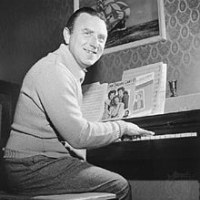Sammy Fain

Sammy Fain was born as Samuel Feinberg in New York City on June 17,1902. His family soon moved to Sullivan County in New York State, where his father was a cantor. While still in school, Fain taught himself to play the piano and began composing popular songs. He sent some of these to publishers, but all were rejected. After completing high school, Fain returned to New York City to continue to pursue songwriting.
His first job was as a stockroom boy for Mills Music Publishing and one day his boss caught Fain playing some of his own songs in the audition room. His boss gave him a job as a song plugger, at which he became adept and later worked for several different publishers in the same capacity. During that period, he met singer Artie Dunn, and they formed a singing team that was popular in vaudeville and on radio.
Fain continued to compose songs, and in 1925 he had one published for the first time. The title was "Nobody Knows What a Red-Headed Mama Can Do," with lyrics by Irving Mills and Al Dubin. Around that time, Fain met lyricist Irving Kahal, with whom he worked until Kahal's death in 1942. Their first song, on which Francis Wheeler also collaborated on the words, was "Let a Smile Be Your Umbrella" in 1927. Other early songs by Fain and Kahal were "I Left My Sugar Standing in the Rain" and "Wedding Bells are Breaking Up That Old Gang of Mine." In 1930, Paramount Pictures signed them to write a song for the Maurice Chevalier movie The Big Pond. They traveled to Los Angeles, composed "You Brought a New Kind of Love To Me" (written with Pierre Norinan), and adopted that city as their base of operations. For the remainder of their partnership, they worked for several movie studios. They did not write entire scores, but mainly focused on providing one or two songs for many films. Some of their better-remembered movie tunes include: "When I Take My Sugar to Tea" (from the 1931 Marx Brothers movie Monkey Business), "By a Waterfall" (from Footlight Parade (1933)), and the title song from Easy to Love (1934).
The duo also wrote for Broadway, with their greatest successes being Everybody's Welcome (1931), HelIzapoppin (1938), and George White's Sandals of 1939. A 1938 Broadway flop titled Right This Way, included two of Fain and Kahal’s best songs: "I Can Dream, Can't I?" and "I"ll Be Seeing You." The former was a hit for Tommy Dorsey in 1938 and an even bigger hit for the Andrews Sisters in 1950. The latter did not become popular until 1944, two years after Kahal's death, when both Bing Crosby and Tommy Dorsey recorded it.
Following Kahal's death, Fain worked with numerous composers. In 1945 he worked with Ralph Freed on "The Worry Song," which was interpolated into the Sammy Cahn and Jule Styne score for the movie Anchors Aweigh. That is the song to which Gene Kelly danced with the animated Jerry the Mouse. In 1949 Fain and Hilliard wrote "Dear Hearts and Gentle People,"' which was popularized via recordings by Bing Crosby and Dinah Shore. Fain wrote a Broadway musical with E.Y. "Yip" Harburg and Fred Saidy, but Flahooley opened in 1951 to negative reviews. Set in a toy factory, the show parodied the rabid anti-communist sentiment and witch hunts that pervaded 1950s America through a fantastic storyline that was nearly impossible to follow. The cast included the Bill Baird Marionettes, Yma Sumac and Barbara Cook. Despite the score, which included "Here’s to Your Illusions," audiences stayed away.
Fain collaborated on the scores to two early 1950’s Wait Disney animated features. With Hilliard he wrote the music for Alice in Wonderland (1951), which included "I'm Late" and "Very Good Advice." Sammy Cahn teamed with him on Peter Pan (1953), which featured "Your Mother and Mine" and "Second Star to the Right." That same year Fain and Paul Francis Webster composed the score of the Doris Day movie Calamity Jane, for which they won the Academy Award for Best Song for "Secret Love." The following year they wrote the score for another Doris Day movie, Lucky He, which included "I Speak to the Stars." In 1955, they won another Academy Award for Best Song for the title tune to “Love Is a Many Splendored Thing”, which was a hit for The Four Aces. Other movie songs from the team included the title song sung by Pat Boone from 1957's April Love, and “A Certain Smile” from the 1958 movie of the same name, sung by Johnny Mathis.
Throughout the 1960’s and 1970’s, Fain continued to write for the movies, his last effort being the 1977 Disney animated feature The Rescuers. Sammy Fain died of a heart attack on December 6, 1989 in Los Angeles, California.




